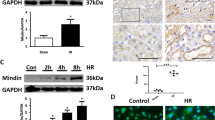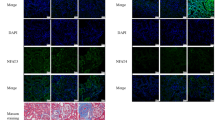Abstract
Tumor necrosis factor-alpha (TNF-α) has been found to be centrally involved in the development of ischemia-reperfusion injury (IRI)-induced inflammation and apoptosis. Knockdown of TNF-α gene using small interfering RNA (siRNA) may protect renal IRI. Renal IRI was induced in mice by clamping the left renal pedicle for 25 or 35 min. TNF-α siRNA was administered intravenously to silence the expression of TNF-α. The therapeutic effects of siRNA were evaluated in terms of renal function, histological examination, and overall survival following lethal IRI. A single systemic injection of TNF-α siRNA resulted in significant knockdown of TNF-α expression in ischemia-reperfusion injured kidney. In comparison with control mice, levels of BUN and serum creatinine were significantly reduced in mice treated with siRNA. Pathological examination demonstrated that tissue damage caused by IRI was markedly reduced as a result of TNF-α siRNA treatment. Furthermore, survival experiments showed that nearly 90% of control mice died from lethal IRI, whereas more than 50% of siRNApretreated mice survived until the end of the eight-day observation period. We have demonstrated for the first time that silencing TNF-α by specific siRNA can significantly reduce renal IRI and protect mice against lethal kidney ischemia, highlighting the potential for siRNA-based clinical therapy.
Similar content being viewed by others
References
Tanaka M, Mokhtari GK, Terry RD, et al. Prolonged cold ischemia in rat cardiac allografts promotes ischemiareperfusion injury and the development of graft coronary artery disease in a linear fashion. J Heart Lung Transplant, 2005,24(11):1906–1914
Renders L, Heemann U. Chronic renal allograft damage after transplantation: what are the reasons, what can we do? Curr Opin Organ Transplant, 2012,17(6):634–639
Kyllonen LE, Salmela KT, Eklund BH, et al. Long-term results of 1047 cadaveric kidney transplantations with special emphasis on initial graft function and rejection. Transpl Int, 2000,13(2):122–128
Daemen MA, de Vries B, Buurman WA. Apoptosis and inflammation in renal reperfusion injury. Transplantation, 2002,73(11):1693–1700
Yang FJ, He YH, Zhou JH. Fenofibrate pre-treatment suppressed inflammation by activating phosphoinositide 3 kinase/protein kinase B (PI3K/Akt) signaling in renal ischemia-reperfusion injury. J Huazhong Univ Sci Technolog Med Sci, 2015,35(1):58–63
Zhang J, Li JH, Wang L, et al. Glucocorticoid receptor agonist dexamethasone attenuates renal ischemia/reperfusion injury by up-regulating eNOS/iNOS. J Huazhong Univ Sci Technolog Med Sci, 2014,34(4):516–520
Donnahoo KK, Shames BD, Harken AH, et al. Review article: the role of tumor necrosis factor in renal ischemia-reperfusion injury. J Urol, 1999,162(1):196–203
Daemen MA, van de Ven MW, Heineman E, et al. Involvement of endogenous interleukin-10 and tumor necrosis factor-alpha in renal ischemia-reperfusion injury. Transplantation, 1999,67(6):792–800
Takada M, Nadeau KC, Shaw GD, et al. The cytokineadhesion molecule cascade in ischemia/reperfusion injury of the rat kidney. Inhibition by a soluble P-selectin ligand. J Clin Invest, 1997,99(11):2682–2690
Crisman JM, Richards LL, Valach DP, et al. Chemokine expression in the obstructed kidney. Exp Nephrol, 2001,9(4):241–248
Tasdemir C, Tasdemir S, Vardi N, et al. Protective effect of infliximab onischemia/reperfusion-induced damage in rat kidney. Ren Fail, 2012,34(9):1144–1149
Maier S, Emmanuilidis K, Entleutner M, et al. Massive chemokine transcription in acute renal failure due to polymicrobial sepsis. Shock, 2000,14(2):187–192
Esposito E, Mazzon E, Muia C, et al. Splanchnic ischemia and reperfusion injury is reduced by genetic or pharmacological inhibition of TNF-alpha. J Leukoc Biol, 2007,81(4):1032–1043
Souza DG, Ferreira FL, Fagundes CT, et al. Effects of PKF242-484 and PKF241-466, novel dual inhibitors of TNF-alpha converting enzyme and matrix metalloproteinases, in a model of intestinal reperfusion injury in mice. Eur J Pharmacol, 2007,57(1):72–80
Di Paola R, Genovese T, Impellizzeri D, et al. The renal injury and inflammation caused by ischemia-reperfusion are reduced by genetic inhibition of TNF-aR1: a comparison with infliximab treatment. Eur J Pharmacol, 2013,700(1-3):134–146
Chim TE, Li M, Qian H, et al. RNA interference: a potent tool for gene-specific therapeutics. Am J Transplant, 2004,4(8):1227–1236
Zheng X, Feng B, Chen G, et al. Preventing renal ischemia-reperfusion injury using small interfering RNA by targeting complement 3 gene. Am J Transplant, 2006,6(9):2099–2108
Zhang X, Zheng X, Sun H, et al. Prevention of renal ischemic injury by silencing the expression of renal caspase 3 and caspase 8. Transplantation, 2006,82(12):1728–1732
Yang C, Zhao T, Zhao Z, et al. Serum-stabilized naked caspase-3 siRNA protects autotransplant kidneys in a porcine model. Mol Ther, 2014,22(10):1817–1828
Hamar P, Song E, Kokeny G, et al. Small interfering RNA targeting Fas protects mice against renal ischemiareperfusion injury. Proc Natl Acad Sci USA, 2004,101(41):14883–14888
Singaravelu K, Padanilam BJ. p53 target Siva regulates apoptosis in ischemic kidneys. Am J Physiol Renal Physiol, 2011,300(5):F1130–1141
Xu Y, Arenas IA, Armstrong SJ, et al. Estrogen improves cardiac recovery after ischemia/reperfusion by decreasing tumor necrosis factor-alpha. Cardiovasc Res, 2006,69(4):836–844
Author information
Authors and Affiliations
Corresponding author
Rights and permissions
About this article
Cite this article
Hou, L., Chen, G., Feng, B. et al. Small interfering RNA targeting TNF-α gene significantly attenuates renal ischemia-reperfusion injury in mice. J. Huazhong Univ. Sci. Technol. [Med. Sci.] 36, 634–638 (2016). https://doi.org/10.1007/s11596-016-1638-z
Received:
Revised:
Published:
Issue Date:
DOI: https://doi.org/10.1007/s11596-016-1638-z




